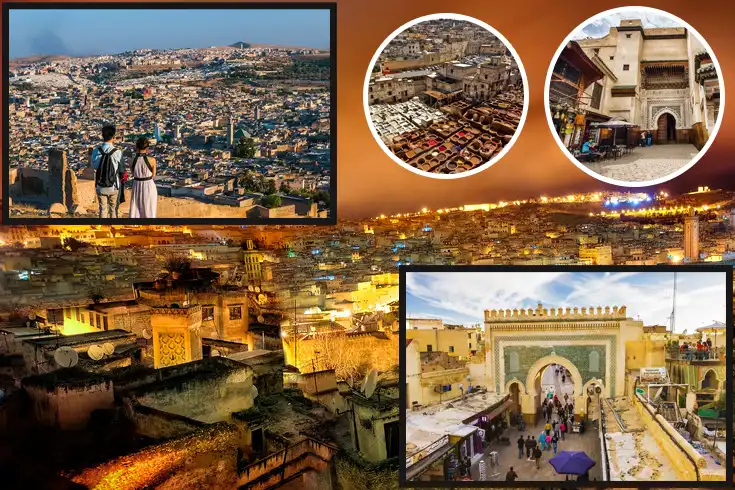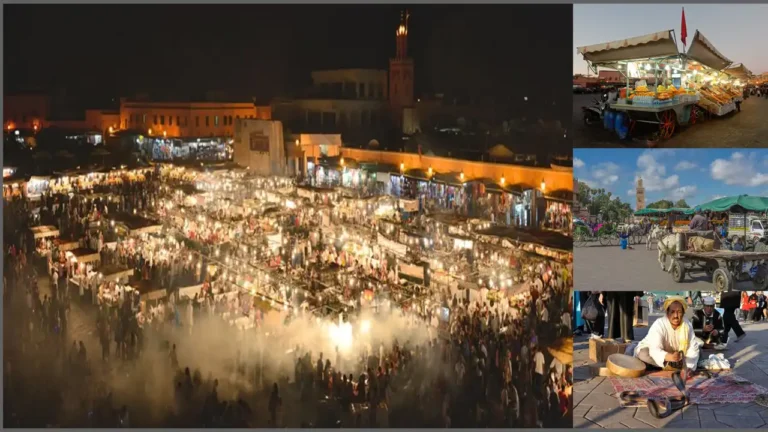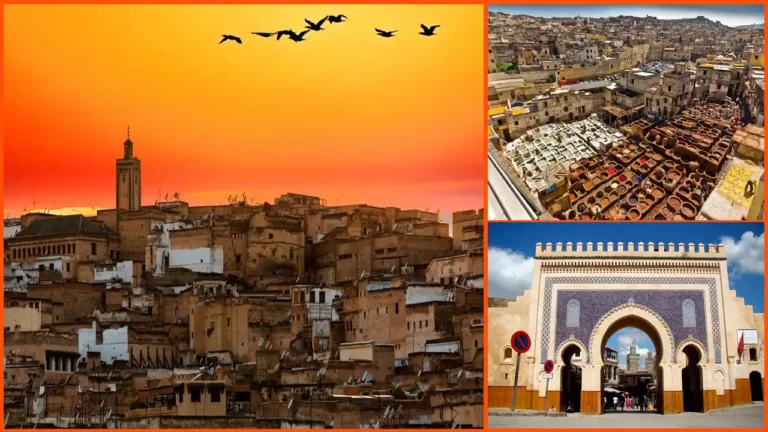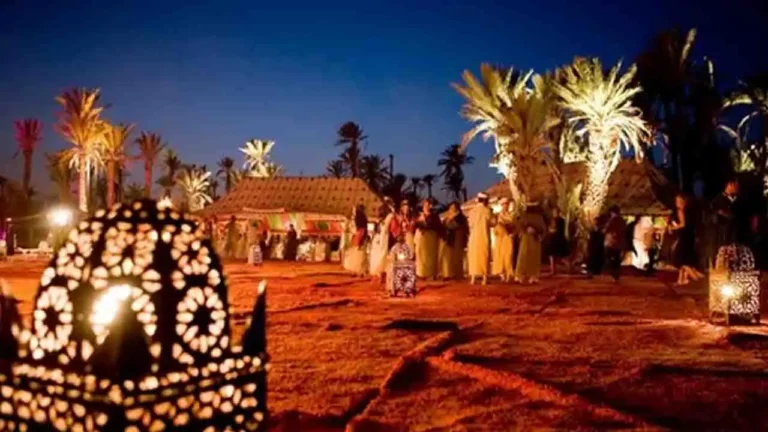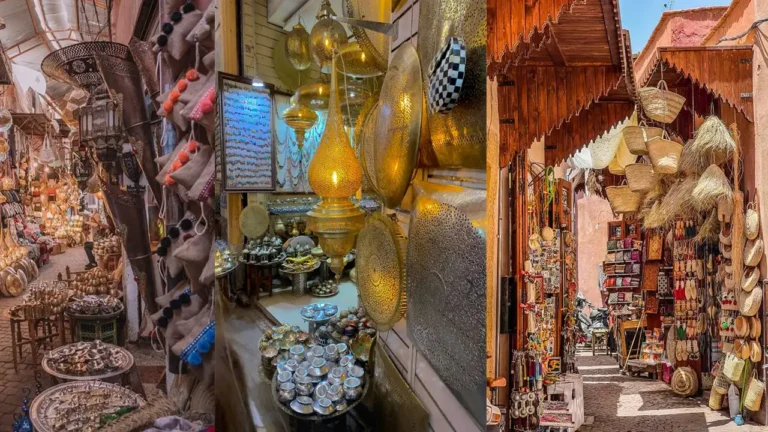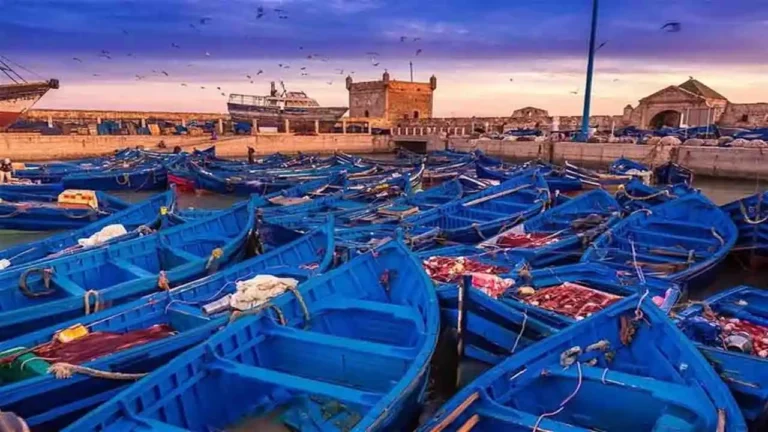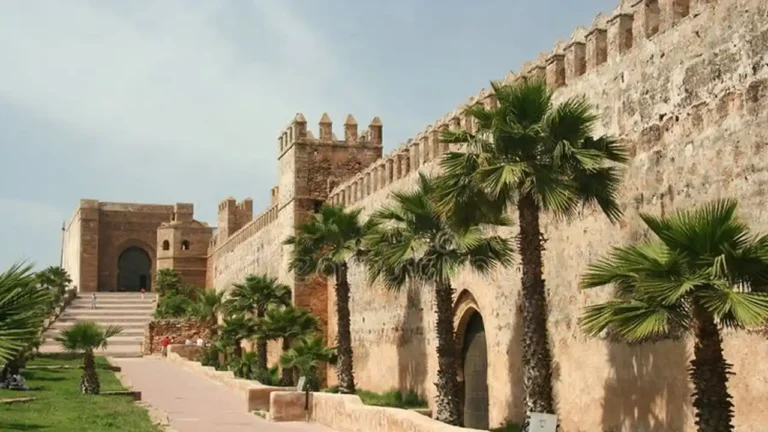Your Inspiring Guide to Fes: Experience Morocco’s Historic and Cultural Wonders
Introduction: Welcome to Fes
Fes, Morocco’s spiritual and cultural capital, is a city steeped in history and tradition. Known as the soul of Morocco, this enchanting destination invites travelers to experience a world where the past and present intertwine seamlessly. Nestled at the base of the Atlas Mountains, Fes is home to the world’s oldest continuously operating university, Al Quaraouiyine, and the mesmerizing Fes Medina, a UNESCO World Heritage site and the largest car-free urban area on the planet.
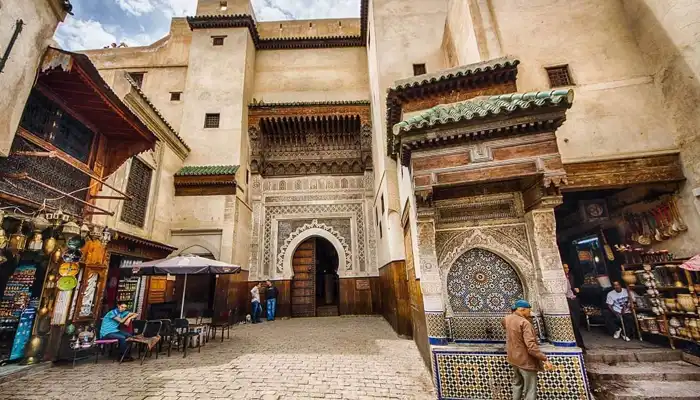
This guide to Fes will help you uncover the top Fes attractions, from iconic landmarks like Bab Bou Jeloud and Chouara Tanneries to hidden gems within the old medina. Whether you’re captivated by Islamic heritage, traditional crafts, or mouthwatering Moroccan cuisine, Fes promises a journey unlike any other. Let’s explore the wonders of Morocco’s spiritual and cultural capital together.
Table of Contents
A Brief History of Fes: Morocco’s Oldest Imperial City
Fes is not only Morocco’s oldest imperial city but also a beacon of Islamic culture and learning. Founded in 789 by Idris I, the city flourished as a spiritual and intellectual hub under successive dynasties. Over the centuries, its strategic location and cultural importance attracted scholars, traders, and artisans, cementing its reputation as the intellectual heart of the Islamic world during the medieval period.
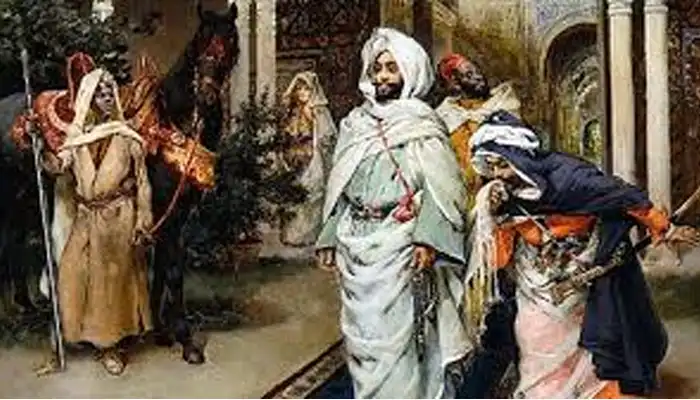
The crowning jewel of Fes’ historical legacy is Al Quaraouiyine University, established in 859. Recognized as the world’s oldest continuously operating university, it became a melting pot of cultures and ideas, drawing students and scholars from across the globe. Its enduring influence is reflected in the city’s numerous madrasas, such as the beautifully preserved Medersa Bou Inania.
Fes is also famous for its protective city walls, which date back centuries and encapsulate the Fes Medina (Fes El Bali). These walls, punctuated by ornate gates like Bab Bou Jeloud, served as a fortress against invaders while showcasing the city’s architectural splendor. Walking through the medina today, visitors can still witness the harmonious blend of Arab, Berber, and Andalusian influences that define Fes’ heritage.
From its role as the capital of the Idrisid Dynasty to its current status as Morocco’s spiritual and cultural capital, Fes remains a living testament to the country’s rich history. Each alleyway, mosque, and market stall tells a story that connects the city’s glorious past to its vibrant present.
Top Attractions in Fes
Al Quaraouiyine University and Mosque
Step into the heart of Islamic scholarship at Al Quaraouiyine University, a site that has shaped the intellectual history of the Islamic world. Established in 859, it remains a revered institution and an active mosque. While non-Muslims cannot enter, the stunning exterior and its surrounding bustling streets offer a glimpse into its spiritual significance.
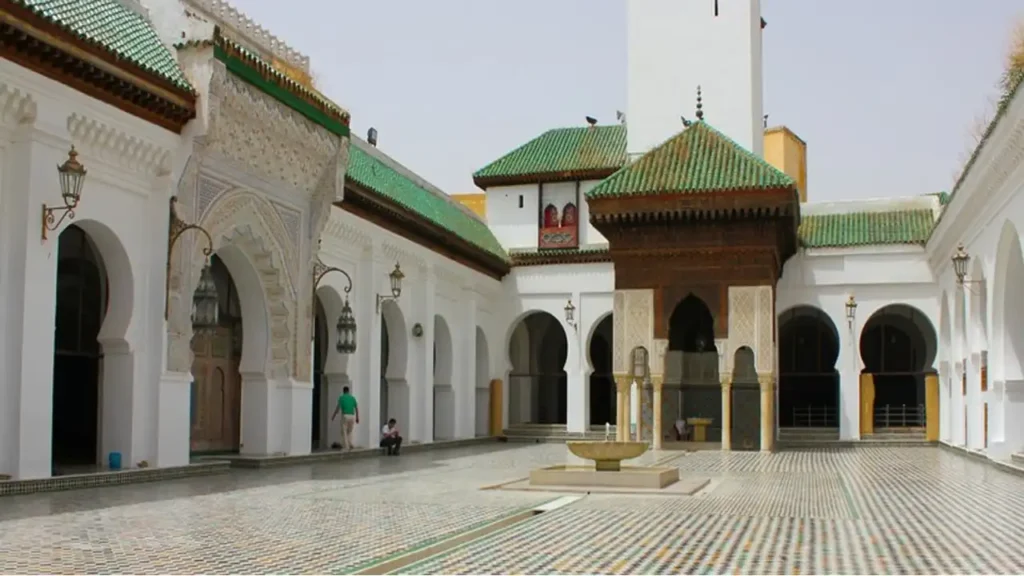
Medersa Bou Inania
Built in the 14th century, Medersa Bou Inania is a masterpiece of Moroccan craftsmanship. Its intricate zellij tiles, carved cedar wood, and stucco decorations make it one of Fes’ most breathtaking sites. As one of the few religious buildings in Morocco open to non-Muslims, it offers a rare opportunity to explore the city’s rich Islamic heritage up close.

Bab Bou Jeloud (The Blue Gate)
The iconic Bab Bou Jeloud serves as the grand entrance to Fes El Bali, welcoming visitors into the vibrant medina. Its blue-tiled facade represents the city’s Andalusian influence, while the green interior reflects Islamic tradition. From this gateway, you’ll step into a maze of markets, workshops, and historical landmarks.
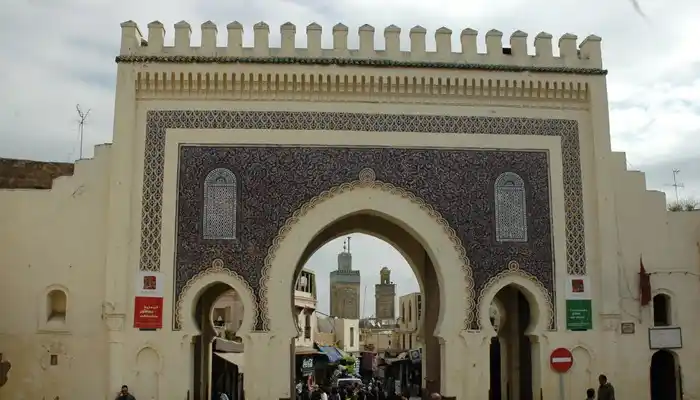
Chouara Tanneries
Discover Fes’ ancient leather-making tradition at the Chouara Tanneries, where the sights, sounds, and scents immerse you in centuries-old craftsmanship. From nearby terraces, you can watch workers dyeing leather in vibrant hues, using techniques passed down through generations. Be sure to explore the surrounding leather markets for unique souvenirs.
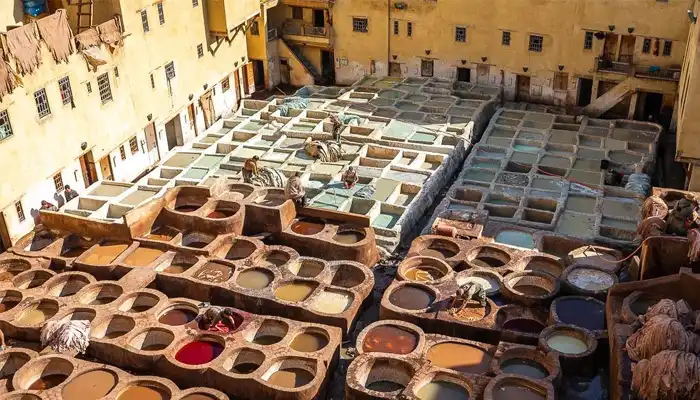
Fes El Bali (Old Medina)
Recognized as a UNESCO World Heritage site, Fes El Bali is a living museum of Moroccan culture and history. This sprawling medina is home to artisan workshops, historic mosques, and hidden courtyards. As you navigate its narrow streets, you’ll encounter the essence of Moroccan life, from bustling souks to serene places of worship.
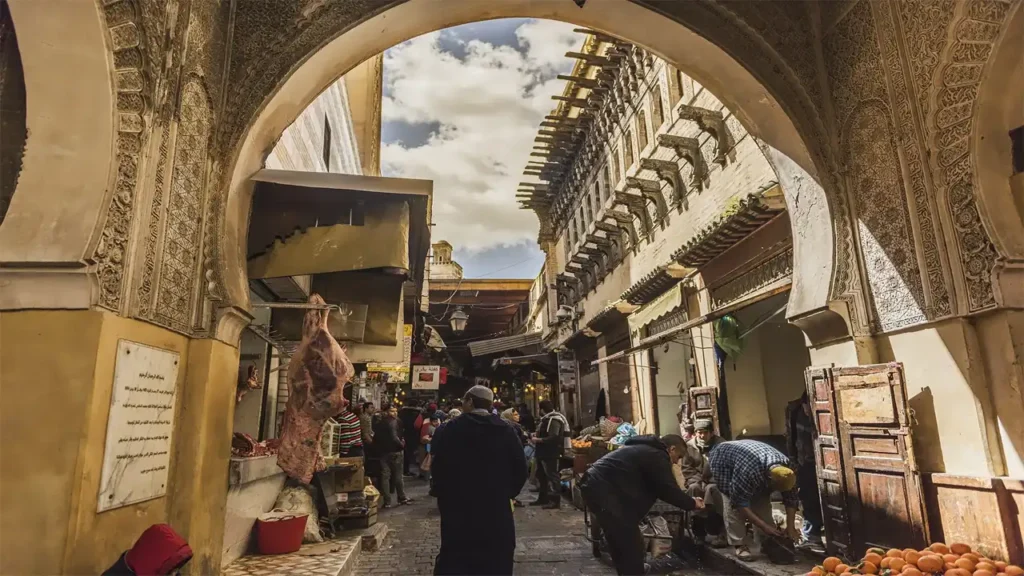
Exploring the Fes Medina: A Walk Through History
A Labyrinth of History and Culture
The Fes Medina, also known as Fes El Bali, is the largest car-free urban area in the world and a treasure trove of history and culture. Established in the 9th century, it offers a sensory journey through narrow, winding alleys lined with ancient buildings, vibrant souks, and historic landmarks. Every corner of the medina reveals a new story, from the echoes of artisans crafting their wares to the tranquil courtyards where locals gather.
Traditional Moroccan Markets and Crafts
Fes Medina is renowned for its souks, where centuries-old traditions of craftsmanship thrive. Some must-visit markets include:
- Souk el Henna: Known for natural cosmetics and traditional Moroccan remedies like henna and kohl.
- Souk el Attarine: A sensory delight of aromatic spices, perfumes, and oils, perfect for taking a piece of Morocco home.
- Leather Markets: Explore the shops around Chouara Tanneries to find high-quality bags, shoes, and jackets dyed using age-old methods.
Historical Treasures Within the Medina
Within the medina, visitors can marvel at landmarks like Al Quaraouiyine University and Mosque, Medersa Bou Inania, and the ancient city walls. These sites embody the medina’s status as a center of Islamic learning and culture for over a millennium.
Tips for Navigating the Medina
- Use Landmarks: Bab Bou Jeloud and the minaret of Al Quaraouiyine Mosque are excellent reference points.
- Hire a Local Guide: A guide can help you uncover hidden gems and share historical insights.
- Prepare for Sensory Overload: Wear comfortable shoes, bring water, and embrace the medina’s bustling atmosphere.
With its vibrant markets, historic landmarks, and timeless charm, the Fes Medina is more than a destination—it’s an unforgettable journey into the heart of Moroccan culture.
Where to Stay in Fes
Fes offers a variety of accommodation options to suit every traveler’s needs, from luxury-seekers to budget-conscious adventurers. Staying in the right place can significantly enhance your experience, whether you prefer the charm of a traditional riad, the comfort of a modern hotel, or the affordability of a cozy guesthouse.
Riads: Experience Traditional Moroccan Hospitality
For an authentic Moroccan experience, staying in a riad is a must. These traditional houses, often centuries old, are built around serene courtyards adorned with intricate tiles, carved wood, and lush greenery. Many riads in Fes offer intimate, boutique-style accommodations with personalized service, making your stay both comfortable and culturally immersive.
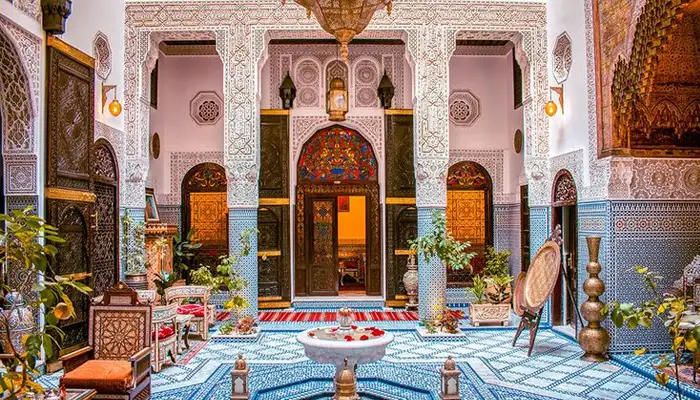
Some of the best riads in Fes are located within the medina, just steps away from key attractions like the Chouara Tanneries and Medersa Bou Inania. Rooftop terraces often provide stunning views of the medina’s skyline, offering a tranquil retreat from the lively streets below.
Hotels: Modern Comfort with Moroccan Flair
For those seeking convenience and modern amenities, Fes has a range of hotels catering to various budgets. From luxurious five-star establishments featuring spas and swimming pools to more affordable options, hotels often combine contemporary comfort with traditional Moroccan design.
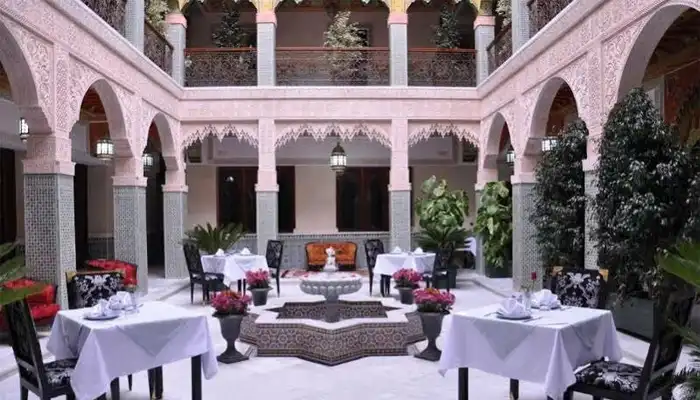
Many hotels are located near or just outside the medina, providing easy access to explore the city while offering a peaceful escape at night. Look for hotels that blend Islamic architecture with modern amenities for a uniquely Moroccan stay.
Guesthouses: Affordable Charm
Travelers on a budget will find guesthouses in Fes to be both affordable and welcoming. Often family-run, these smaller accommodations offer a cozy, home-like atmosphere with hosts eager to share local tips and traditions. Many guesthouses are nestled within the medina, giving you a chance to live like a local while enjoying homemade Moroccan meals.
Choosing the Right Accommodation
Deciding where to stay depends on your travel preferences:
- For cultural immersion: Choose a riad in the heart of the medina.
- For modern amenities: Opt for a hotel with contemporary facilities.
- For budget travel: Guesthouses offer affordability without sacrificing charm.
A Food Lover’s Guide: Where to Eat in Fes
As Morocco’s culinary capital, Fes boasts a vibrant food scene that blends traditional flavors with modern creativity. From aromatic tagines to savory pastilla, every dish tells a story of Moroccan culture and hospitality. Whether dining at upscale restaurants or sampling street food, Fes offers something for every palate.
Traditional Moroccan Dishes to Try
No visit to Fes is complete without tasting its signature dishes:
- Tagine: Slow-cooked stews with lamb, chicken, or vegetables, often seasoned with a blend of spices.
- Pastilla: A sweet-savory pie filled with pigeon or chicken, almonds, and cinnamon.
- Harira: A hearty soup of tomatoes, lentils, and chickpeas, traditionally served during Ramadan.
- Zaalouk: A smoky eggplant and tomato salad, perfect with freshly baked bread.
Best Restaurants in Fes
- Dar Roumana: Enjoy fine dining in a beautifully restored riad, featuring seasonal Moroccan dishes.
- Restaurant Nur: Known for its innovative take on Moroccan cuisine, blending local ingredients with modern techniques.
- Café Clock: A vibrant spot in the medina famous for its camel burger and cultural events.
- Le Tarbouche: A budget-friendly choice offering classic Moroccan fare in a relaxed setting.
Street Food in the Medina
For an authentic and immersive culinary experience, explore the street food stalls in Fes El Bali. Must-try items include:
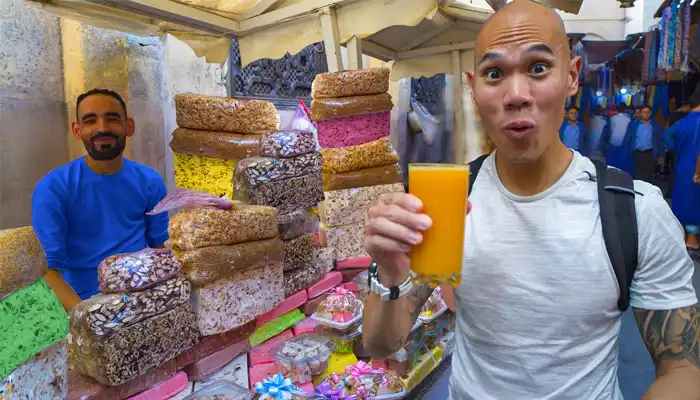
- Msemen: Flaky flatbread served with honey or butter.
- Makouda: Fried potato cakes paired with spicy harissa.
- Sfenj: Moroccan doughnuts, crispy and sweet.
Cooking Classes in Fes
Take a piece of Fes home by joining a cooking class. Learn to prepare dishes like tagine and couscous with expert chefs who guide you through local markets to select fresh ingredients. It’s an unforgettable way to connect with Moroccan culture.
Shopping in Fes: Souks and Artisan Crafts
Shopping in Fes is more than a pastime—it’s a cultural experience that immerses you in the city’s rich artisan heritage. The medina is a labyrinth of souks offering everything from hand-woven textiles to vibrant ceramics and finely crafted leather goods.
Souks of Fes: A Shopper’s Paradise
- Souk el Attarine: Known for its aromatic spices, perfumes, and oils, this market is a sensory delight.
- Souk el Henna: Specializes in natural cosmetics, henna, and traditional Moroccan remedies.
- Leather Markets: Located near the Chouara Tanneries, these stalls feature high-quality leather goods, including bags, slippers, and jackets.
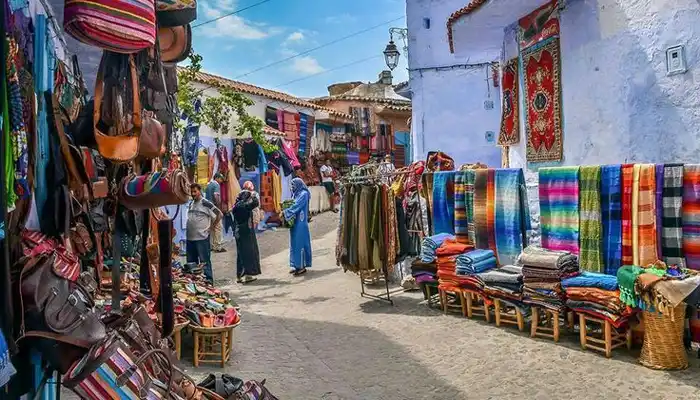
Artisan Crafts: The Best of Moroccan Handicrafts
Fes is renowned for its traditional crafts, many of which have been passed down through generations:
- Leather Goods: Items from Fes’ tanneries are prized for their durability and vibrant colors.
- Ceramics and Pottery: Look for hand-painted blue-and-white patterns, a signature of Fes artisans.
- Textiles and Carpets: Intricately woven rugs and tapestries blend Arab, Berber, and Andalusian influences.
- Jewelry and Metalwork: Discover ornate silver and brass items, from lanterns to custom-made jewelry.
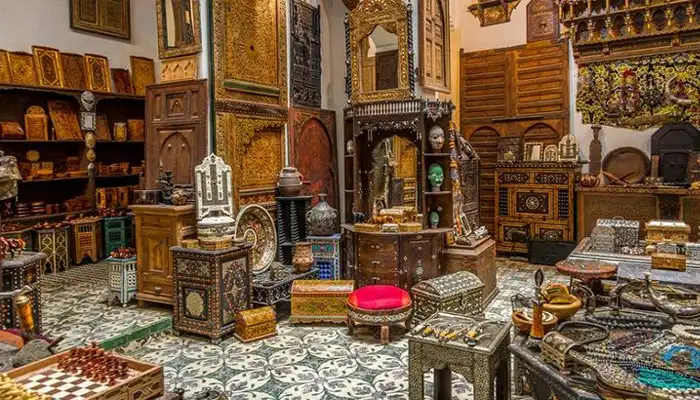
Tips for Shopping in Fes
- Bargaining: Start with an offer at about 50% of the asking price and negotiate politely.
- Artisan Cooperatives: For authentic, fairly priced goods, visit cooperatives that directly support local artisans.
- Quality Check: Examine items carefully to ensure they are handmade and authentic.
Day Trips and Excursions from Fes
Fes is a perfect base for exploring the surrounding wonders of northern Morocco. From ancient Roman ruins to picturesque mountain towns, the region offers a variety of day trips that showcase Morocco’s diverse heritage and landscapes.
Meknes: Discovering Another Imperial City
Just an hour away, Meknes is a quieter yet equally fascinating imperial city. Highlights include:
- Bab Mansour: A monumental gate adorned with intricate tilework.
- Moulay Ismail Mausoleum: The resting place of one of Morocco’s most famous rulers.
- Royal Stables: Once home to thousands of horses, these stables are an architectural marvel.
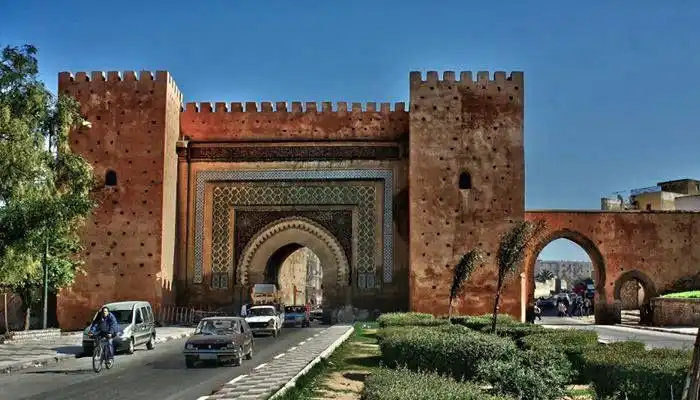
Volubilis: Morocco’s Best-Preserved Roman Ruins
About 90 minutes from Fes, Volubilis offers a glimpse into Morocco’s ancient past. Walk among stunning mosaics, the triumphal arch, and remnants of Roman villas in this UNESCO World Heritage site. Pair your visit with a stop in Moulay Idriss for panoramic views and cultural insights.
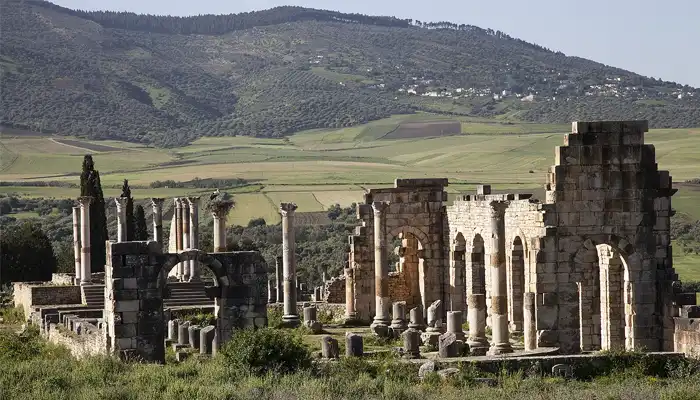
Moulay Idriss: A Sacred Town on the Hills
Perched on twin hills, this holy town is a pilgrimage site for Moroccans. Explore its narrow streets, soak in breathtaking views, and visit the mausoleum of Moulay Idriss I, the founder of the Idrisid dynasty.
The Middle Atlas Mountains: Escape into Nature
For nature enthusiasts, the Middle Atlas offers a refreshing retreat:
- Ifrane: Known as “Little Switzerland,” it features alpine architecture and lush parks.
- Azrou’s Cedar Forest: Home to Barbary macaques and ideal for hiking.
- Cedar Woodlands: Perfect for scenic walks and bird-watching.
Gateway to the Sahara: Desert Adventures
For a longer excursion, embark on an overnight trip to Merzouga and the Sahara Desert. Experience:
- Camel Trekking: Journey across golden dunes under the starlit sky.
- Berber Camps: Spend the night in traditional tents and enjoy local hospitality.
- Sunrise Over the Dunes: A breathtaking way to start the day.
Cultural Experiences in Fes
Fes, Morocco’s spiritual and cultural heart, offers travelers an array of immersive experiences that bring its traditions to life. From vibrant festivals to serene hammams and sacred sites, these activities reveal the essence of Fes and its deeply rooted heritage.
Fes Festivals: A Celebration of Art, Culture, and Spirituality
Fes is home to several renowned festivals that highlight its cultural and spiritual significance:
- Fes World Sacred Music Festival: Held annually in May or June, this event attracts performers from around the world, showcasing spiritual music in stunning historic venues such as Bab Makina and Jnan Sbil Gardens. The festival celebrates global spiritual traditions and fosters cultural dialogue.
- Fes Festival of Sufi Culture: This event highlights Sufi music, poetry, and teachings, offering an in-depth look at Morocco’s mystical traditions. Visitors can attend performances and discussions that delve into the spiritual legacy of Fes.
Hammams in Fes: A Traditional Moroccan Spa Experience
A visit to a Moroccan hammam is both relaxing and culturally enriching. These traditional bathhouses are integral to local life, offering a space to unwind, socialize, and rejuvenate. Visitors can:
- Experience Traditional Hammams: Public bathhouses in the medina provide an authentic experience with a focus on community.
- Indulge in Private Hammams: Many riads offer luxurious private hammams with treatments like black soap scrubs and Ghassoul clay wraps. For first-timers, bring your own towel and toiletries, and embrace the ritual for a truly immersive wellness experience.
Spiritual Sites in Fes: Mosques, Madrasas, and Holy Places
Fes is home to some of the most important Islamic landmarks in Morocco:
- Al Quaraouiyine Mosque: Established in 859, it remains a spiritual hub and a symbol of Fes’ scholarly legacy.
- Medersa Bou Inania: This exquisitely detailed madrasa is a peaceful retreat where visitors can marvel at its intricate tilework and cedarwood carvings.
- Zawiyas (Shrines): Sacred sites dedicated to local saints, such as Zawiya Moulay Idriss II, are visited by pilgrims and add to the city’s spiritual ambiance.
Whether attending a festival, visiting a hammam, or exploring sacred sites, Fes offers cultural experiences that deepen your understanding of its rich heritage.
The Best Time to Visit Fes: A Seasonal Guide
Fes is a year-round destination, but each season brings a unique charm. Depending on your preferences, you can enjoy the city’s cultural vibrancy, pleasant weather, or peaceful atmosphere.
Spring (March to May): The Ideal Time to Explore
Spring is the perfect season to visit Fes, with mild temperatures ranging from 15°C to 25°C (59°F to 77°F). This is also when the city comes alive with:
- Fes World Sacred Music Festival: A highlight of spring, this festival attracts global audiences and performers.
- Day Trips: Ideal weather for exploring nearby destinations like Volubilis or the Middle Atlas Mountains.
Summer (June to August): Hot Days and Cultural Festivals
While summer temperatures can soar above 35°C (95°F), early mornings and late evenings offer cooler moments for exploration. Visitors during this time can:
- Attend the Fes Festival of Sufi Culture, which celebrates the city’s spiritual legacy.
- Relax in shaded courtyards or enjoy the comfort of luxurious riads.
Fall (September to November): Cultural Immersion and Perfect Temperatures
With temperatures ranging from 20°C to 30°C (68°F to 86°F), fall provides a balance of pleasant weather and fewer crowds. It’s an excellent time to:
- Stroll through the medina at a leisurely pace.
- Take excursions to nearby attractions like Moulay Idriss and the Cedar Forest of Azrou.
Winter (December to February): Quiet and Cool Exploration
Winter brings cooler weather, averaging 10°C to 18°C (50°F to 64°F), and occasional rain. It’s a peaceful time to:
- Explore indoor attractions like madrasas and museums.
- Enjoy a cozy hammam experience or sip mint tea in a riad.
No matter when you visit, Fes promises a rich and rewarding experience, tailored to the season’s unique offerings.
Getting Around: Tips for Navigating Fes
Navigating Fes can be an adventure in itself, especially within the labyrinthine streets of the medina. With a few practical tips, you can enjoy the journey while staying oriented.
Walking in the Medina
- Best Way to Explore: The Fes Medina (Fes El Bali) is a car-free zone, making walking the ideal way to experience its charm. The narrow alleyways, bustling souks, and hidden courtyards are best discovered on foot.
- Navigation Tips: Use landmarks like Bab Bou Jeloud and Al Quaraouiyine Mosque to orient yourself. Offline maps or navigation apps like Google Maps can also be helpful.
- Embrace Getting Lost: Wandering aimlessly is part of the medina’s allure—every twist and turn leads to a new discovery.
Taxis and Public Transport
- Petit Taxis: Red taxis operate within the city. Ensure the meter is running or agree on a fare beforehand.
- Grand Taxis: Ideal for trips to nearby destinations like Meknes or Volubilis, these shared taxis can be booked at stands or through accommodations.
Guided Tours
For a stress-free experience, consider hiring a local guide:
- Benefits: Gain historical context, uncover hidden gems, and avoid getting lost.
- Options: Choose between group or private tours tailored to your interests.
Practical Tips
- Wear comfortable shoes for navigating cobblestone streets.
- Carry water and take breaks in shaded areas, especially during summer.
- Trust locals—they’re often happy to point you in the right direction.
Navigating Fes is as much about the journey as the destination. With these tips, you can focus on soaking up the city’s vibrant culture and history.
Conclusion: Why Fes Should Be on Your Travel Itinerary
Fes is a city like no other—a living museum where history, culture, and spirituality converge. Walking through its ancient streets, you’ll encounter centuries-old traditions, from the artistic mastery of its medinas to the sacred rituals of its mosques and shrines. As Morocco’s spiritual and cultural capital, Fes offers an experience that transcends the ordinary.
The city’s UNESCO-listed medina, vibrant souks, and architectural marvels like Al Quaraouiyine University and Medersa Bou Inania showcase its enduring legacy as a center of Islamic learning. Beyond the historical landmarks, Fes captivates with its bustling markets, culinary delights, and cultural festivals that bring its rich heritage to life.
Fes is more than a destination—it’s an invitation to connect with Morocco’s soul. Whether you’re seeking spiritual enrichment, artistic inspiration, or a deeper understanding of Moroccan culture, Fes promises a journey you’ll never forget. Make it a must-visit stop on your Moroccan itinerary, and prepare to be enchanted by its timeless charm.
